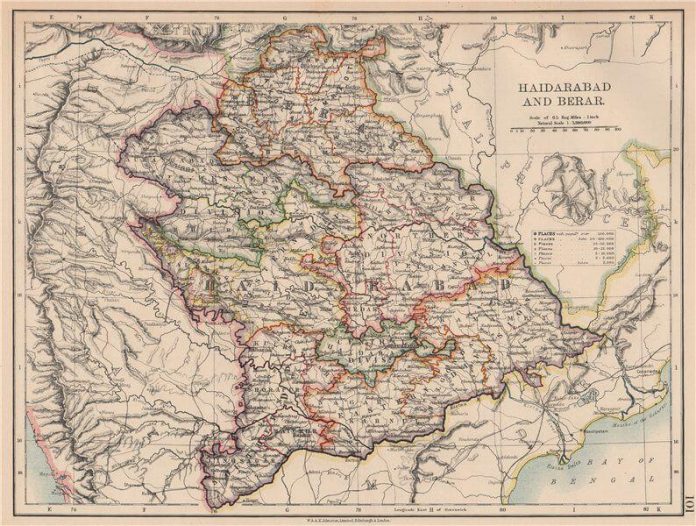This article is written by Sanjana Jain, from Guru Gobind Singh Indraprastha University, Delhi. This article talks about the background, history, objective and provisions of the Berar Laws Act, 1941.
Table of Contents
Introduction
Berar was a province in British India, which was ruled by the Nizam of Hyderabad. Berar was also known as the Hyderabad Assigned Districts. It was administered by the British after 1853, but the Nizam retained its supreme power over the province. The title of the prince of Berar was held by Azam Jah.
The population of Berar was 2,672,673 in 188, which consisted of Telugu, Urdu, and Marathi language speaking people. Berar has about 113,281 square miles (293,400 km2) area.
In 1903, Berar was the Dominion of India for 47 years i.e from 1903 to 1950. By the merger of the Central Provinces with the province of Berar, which was territory leased by the British from the Hyderabad State, was formed. Berar was leased permanently to the British by Nizam Mahbub Ali Khan, Asaf Jah VI for an annual payment of 25 lakhs Rupees by signing an agreement in 1902. On 17 September 1903, Berar was merged with Central Provinces by Lord Curzon.
The Central Provinces were formed because of the merger of the Saugor and Nerbudda Territories and Nagpur Province, in 1861. The Chief Commissioner of the Central Provinces in 1903 was assigned with the administration of the Berar region of the Hyderabad princely state, and on 24 October 1936, Berar was merged with the Central Provinces to form the Central Provinces and Berar for administrative purposes. In 1947, after independence, the Central Provinces and Berar were merged with many princely states, this was also followed by the Constitution of India which was put into effect in 1950.
History of Berar
Berar was ruled by the Nizam of Hyderabad, and after 1853 was administered by the British. But the Nizam had retained his supreme power over the province. In 1902, Berar was leased permanently to the British by Nizam Mahbub Ali Khan, Asaf Jah VI for an annual payment of 25 lakhs Rupees by signing an agreement. On 17 September 1903, Berar was merged with Central Provinces by Lord Curzon. The Residency Order, dated 30 September 1903, was the reason behind the birth of Central Provinces and Berar. The administration of Berar was placed under the Chief Commissioner of the Central Provinces.
The Commissioner-General for the Central Provinces was the one under which the administration of the Berar was placed as the ‘Berar Division’, after October 1, 1993. In 1936, with the formation of the legislative assembly of the ‘Central Provinces and Berar’, when the Central Provinces were fully merged with Berar, it became the ‘Central Provinces and Berar, although Berar Division still remained under Hyderabad.
The Central Provinces and Berar were declared as a province of India in 1947 and they became part of the state of Madhya Pradesh in India in 1950. Berar and Nagpur became part of Bombay in 1956. Also, the Indian states were reorganized along linguistic lines. The state of Bombay was split along linguistic lines in 1960, and the state’s southern, Marathi-speaking portion, including Berar Division, became the new state of Maharashtra.
Objective and scope of the Act
On Berar many Acts are applicable, it was also adapted by Adaptation of Central Act and Ordinance, 1948 and Adaptation of Laws Order, 1950, but Berar does not receive such applicability of acts from the Central Act itself being Proprio Vigore operative in Berar but it receives such applicability by an order made under the Indian (Foreign Jurisdiction) Order in Council, 1902. Certain administrative inconveniences resulted from this. The Act applied differently in Berar from the way it applied in British India, the former consists of the provisions of the British Indian Act, which was applicable on Berar because of the order under the Foreign Jurisdiction Order but not applicable to British India, the latter being an enactment applying Proprio vigore to British India but not to Berar. All the notifications and statutory Rules issued under identical provisions, are operative both in British India and Berar. Repeal of an act in British India made it applicable to Berar, but it does not automatically make the Act inoperative in Berar. Berar and the Central Provinces have been to be one Governor’s Province, since the enforcement of the Government of India Act, 1935, and any Act passed after 1st April 1937 and extends to the whole of British India does extend Proprio Vigore to Berar.
So the primary object of the Berar Laws Act,1941 was to completely acquire the provisions of the Central Acts which had been passed before and after April 1st, 1937. Thus, the Proprio Vigore operations in Berar Central Acts passed before the commencement of Part III of the Government of India Act, 1935, was achieved by one comprehensive enactment while the orders under the Foreign Jurisdiction Order in Council was nullified simultaneously by which those Acts are operative in Berar.
The Berar Laws Act, 1941 consists of 4 sections and 4 schedules. The lists of the acts which are extended to Berar are mentioned in the First schedule, whereas, the lists of the acts which are partially extended to Berar are mentioned in the Second schedule. The Third schedule provides for amendments to the Code of Civil Procedure, 1908 and the Indian Limitation Act, 1908. The Fourth schedule lists the enactments which either ceased to have an effect or got repealed in Berar.
Berar now forms the part of the State of Maharashtra, with the reorganization of states. The States Reorganization Act, 1956, and the Bombay Reorganization Act, 1960, the adoption of laws and orders issued under them have not repealed the Berar laws Act for obvious reasons.
Provisions of the Act
The Berar Laws Act 1941, contains four sections and four schedules only. Section 1 talks about the Short title of the Act. Section 2 talks about the extension of certain Acts to Berar, which says that: All the Acts mentioned in the First and Second Schedule relates to all the matters with respect to which only the Central Legislature has the power to make laws are extended to and shall be in force in Berar, notwithstanding anything contained in the General Clauses Act, 1897 section 3(7). It also says that all the Acts that are mentioned in the Third Schedule shall be amended in the manner outlined in the second column of that Schedule.
Section 3 talks about Cesser of application of certain Acts to Berar, which says that, if any application is made to the berar, under the Indian (Foreign Jurisdiction) Order in Council, 1902, of any acts which are listed in the First and Second Schedule of the Berar act, and also which relates to such matters of The Indian Cotton Cess Act, 1923 and also the matters to which only the Central Legislature has the power to make laws, shall cease to affect.
All notifications, orders, bye-laws, rules and regulations, which have been made or issued under, the acts listed in the first and second schedule of the act and which are applicable on Berar by order under the Indian (Foreign Jurisdiction) Order in Council, and also which are in force at the time of the commencement of this Act, shall be made or issued in accordance of the corresponding provisions of that act, which now extends to, and is in force in, the Berar.
The provision put forth under Section 4 of this Act was to remove the doubt regarding all acts listed in the Forty Schedule because it would cease to have an effect and be repealed in Berar.
Critical analysis
Berar was ruled by the Nizam of Hyderabad, and after 1853 was administered by the British, but the Nizam retained its supreme power over the province. On Berar many acts are applicable, but Berar does not receive such applicability of acts from the Central Act itself being Proprio Vigore operative in Berar but it receives applicability by an order made under the Indian (Foreign Jurisdiction) Order in Council, 1902. Certain administrative inconveniences resulted from this. The act applies distantly in Berar from the way it applied in British India. After the enforcement of the Government of India Act, 1935, the Berar and the Central Province are to be one Governors province.
The primary object of the Berar Laws Act,1941 was to completely acquire the provisions of the Central Acts which were passed before and after April 1st, 1937. The Berar Laws Act, 1941 consists of 4 sections and 4 schedules. The lists of the acts which are extended to Berar are mentioned in the First Schedule, whereas, the lists of the acts which are partially extended to Berar is mentioned in the second schedule. The third schedule provides for amendments to the Code of Civil Procedure,1908 and the Indian Limitation Act,1908. The fourth schedule lists the enactments which either ceased to affect or either repealed in Berar. Berar now forms the part of the State of Maharashtra, with the reorganization of states.
Thus, the scope of the Berar Law Act is very similar to the scenario that existed before the independence of India, but after the independence of India to expect that this act will be relevant was not done with it and hence it’s not applicable after the independence of India.
Conclusion
The Berar law Act 1941, was enacted to make certain Central Laws applicable to the province of Berar. The primary object of the Berar Laws Act,1941 was to completely acquire the provisions of the Central Acts which were passed before and after April 1st, 1937. Berar now does not exist as an independent administrative unit, and now Berar forms the part of the State of Maharashtra, with the reorganization of states. The 148th Law Commission Report, 1993 considered the Berar Laws Act 1941, and recommended its repeal for ‘obvious reasons.’ In 1950, when the Constitution of India came into effect, the Berar and the Central Provinces became the part of the State of Maharashtra, with the reorganization of states, then in 1956, the Berar and Nagpur divisions were transferred to Bombay State, because of the pressure from Marathi Irredentists.
References
- “Gazetteers of the Bombay Presidency-Buldhanadistrict-History-British Period”
- http://lawcommissionofindia.nic.in/101-169/report148.pdf
- http://legislative.gov.in/sites/default/files/A1941-04.pdf=
LawSikho has created a telegram group for exchanging legal knowledge, referrals and various opportunities. You can click on this link and join:
 Serato DJ Crack 2025Serato DJ PRO Crack
Serato DJ Crack 2025Serato DJ PRO Crack










 Allow notifications
Allow notifications


